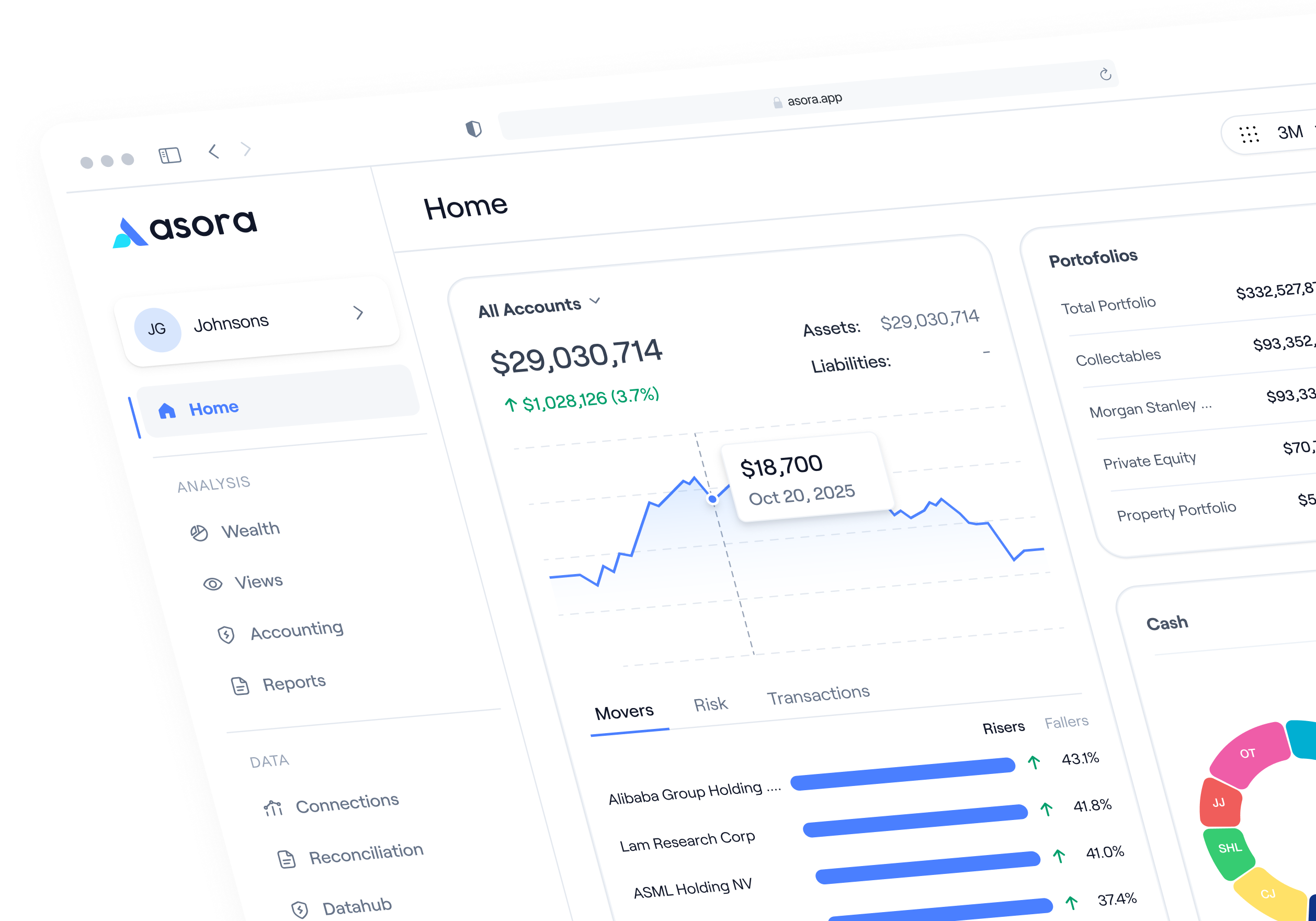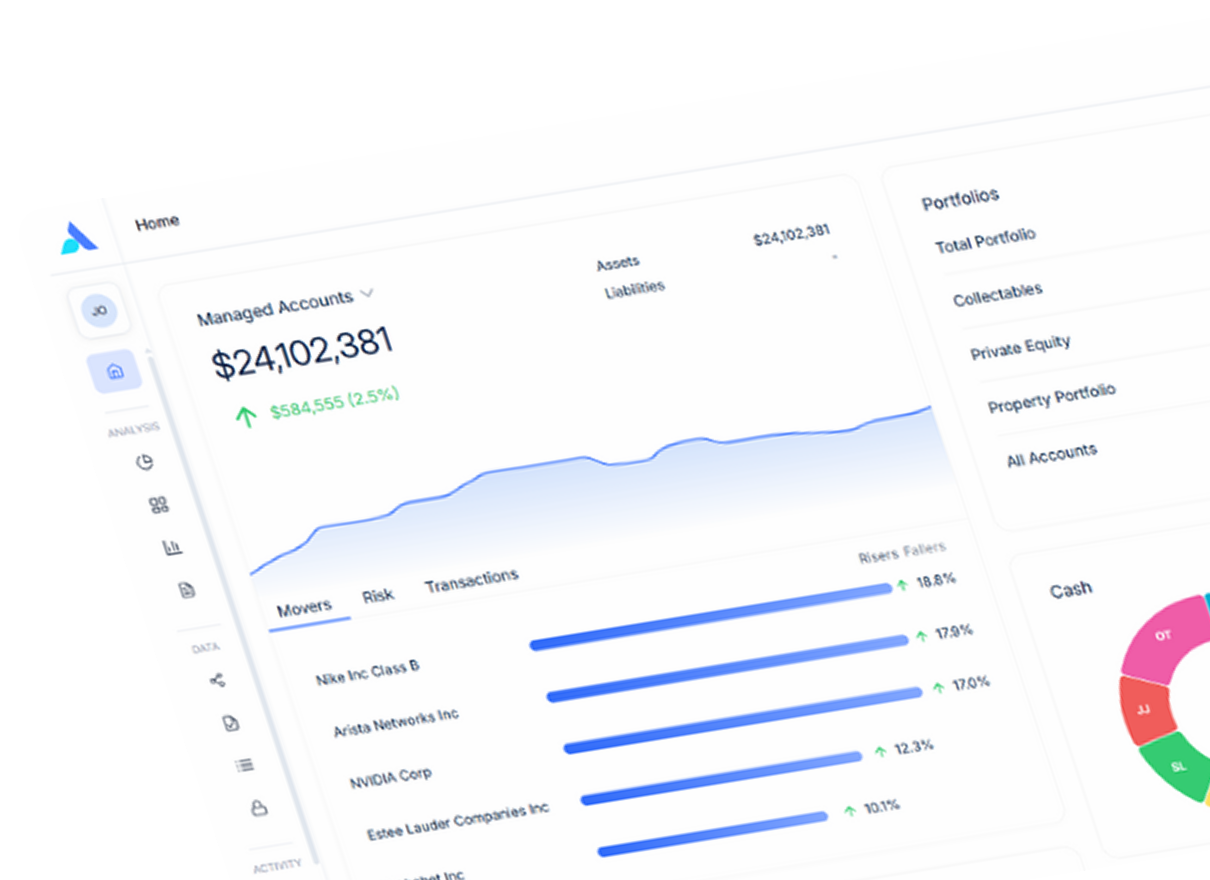Automate your family office
Schedule DemoHeading 1
Heading 2
Heading 3
Heading 4
Heading 5
Heading 6
Lorem ipsum dolor sit amet, consectetur adipiscing elit, sed do eiusmod tempor incididunt ut labore et dolore magna aliqua. Ut enim ad minim veniam, quis nostrud exercitation ullamco laboris nisi ut aliquip ex ea commodo consequat. Duis aute irure dolor in reprehenderit in voluptate velit esse cillum dolore eu fugiat nulla pariatur.
Block quote
Ordered list
- Item 1
- Item 2
- Item 3
Unordered list
- Item A
- Item B
- Item C
Bold text
Emphasis
Superscript
Subscript
TL;DR
Spreadsheets may seem convenient for managing family office data, but they lead to errors, inefficiencies, and security risks as complexity increases. Manual processes slow reporting and limit collaboration. Purpose-built software offers greater accuracy, scalability, and control.
Introduction
Family offices serve as the cornerstone for managing the complex financial and personal affairs of affluent families. From investment strategies to tax planning, these entities must maintain impeccable accuracy and efficiency. However, many family offices still rely heavily on spreadsheets for their financial management, a practice that, while initially practical, often becomes increasingly problematic as operations expand. Spreadsheets, with their ubiquitous presence and user-friendly interface, are frequently the first tool of choice due to their low cost and accessibility. But as the scope and intricacy of financial data grow, the limitations of spreadsheets become glaringly apparent. In this blog post, we delve into the ten primary challenges faced by family offices using spreadsheets for their operations.
By understanding these challenges, family offices can better appreciate the need for more sophisticated financial management systems that offer enhanced accuracy, real-time data access, improved collaboration, and robust security features. Transitioning to these advanced solutions can significantly elevate the efficiency and reliability of family office operations, ensuring better stewardship of the family's wealth.
Challenges of using spreadsheets
- Data Integrity and Accuracy: Spreadsheets are prone to errors, from simple typos to complex calculation mistakes. A small error in data entry or formula can lead to significant financial miscalculations, potentially impacting investment decisions and financial reporting.
- Lack of Real-Time Data: Spreadsheets are static documents that require manual updates. This lack of real-time data can hinder timely decision-making, as the information may be outdated by the time it's reviewed.
- Version Control Issues: Managing multiple versions of a spreadsheet can be chaotic. Different team members might work on separate copies, leading to discrepancies and confusion over which version is the most current and accurate.
- Limited Collaboration: While spreadsheets can be shared, they do not support real-time collaboration effectively. Multiple users working on the same file can result in conflicts and overwritten data, making collaboration cumbersome.
- Scalability Problems: As the volume of data grows, spreadsheets can become unwieldy and slow to process. Large files are prone to crashing, and their performance issues can significantly hinder efficiency and productivity.
- Security Concerns: Spreadsheets often lack robust security features. Sensitive financial information can be easily accessed, modified, or even stolen if adequate protections, such as encryption and access controls, are not in place.
- Inadequate Reporting and Visualisation: While spreadsheets offer basic charting tools, they fall short in providing advanced data visualisation and reporting capabilities. This limitation can make it challenging to present complex financial data in a clear and insightful manner.
- Data Silos: Family offices often manage diverse types of financial information. Spreadsheets tend to create data silos, with information scattered across multiple files and formats, complicating comprehensive data analysis and reporting.
- Time-Consuming Processes: Many tasks in a spreadsheet-driven workflow require manual input and updates. This time-consuming process not only reduces efficiency but also increases the risk of human error.
- Compliance and Audit Challenges: Ensuring compliance with regulatory requirements and preparing for audits can be daunting when using spreadsheets. Tracking changes, maintaining audit trails, and generating compliant reports are difficult without a centralised, automated system.
Moving beyond spreadsheets
To address these challenges, family offices should consider adopting more robust and sophisticated financial management systems. Here are a few benefits of transitioning to specialised family office software:
- Enhanced Accuracy and Integrity: Automated data entry and validation reduce the risk of errors.
- Real-Time Data Access: Integrated systems provide up-to-date information, enabling timely decision-making.
- Improved Collaboration: Cloud-based solutions support real-time collaboration and centralised data management.
- Scalability: Advanced software can handle large volumes of data without performance issues.
- Better Security: Enhanced security features protect sensitive information from unauthorised access.
- Advanced Reporting: Sophisticated reporting tools and data visualisation capabilities offer deeper insights.
- Integrated Data Management: Centralised systems eliminate data silos, providing a holistic view of financial information.
- Efficiency Gains: Automation reduces manual processes, increasing operational efficiency.
Spreadsheets and family offices
While considering the challenges faced by family offices using spreadsheets, it turns out that while spreadsheets may be sufficient for small-scale operations, family offices dealing with complex and sizeable financial activities can significantly benefit from transitioning to more advanced financial management solutions. By doing so, they can improve accuracy, efficiency, and overall financial governance, ensuring better management of the family's wealth and assets.
Asora: Software for the modern family office
At Asora, we recognise the challenges family offices face when relying on spreadsheets. That's why our platform was built to centralise data, streamline reporting, and strengthen governance. By providing real-time visibility across all assets, enhanced security, and intuitive collaboration tools, Asora enables family offices to reduce complexity and focus on stewarding wealth effectively.






.jpg)





